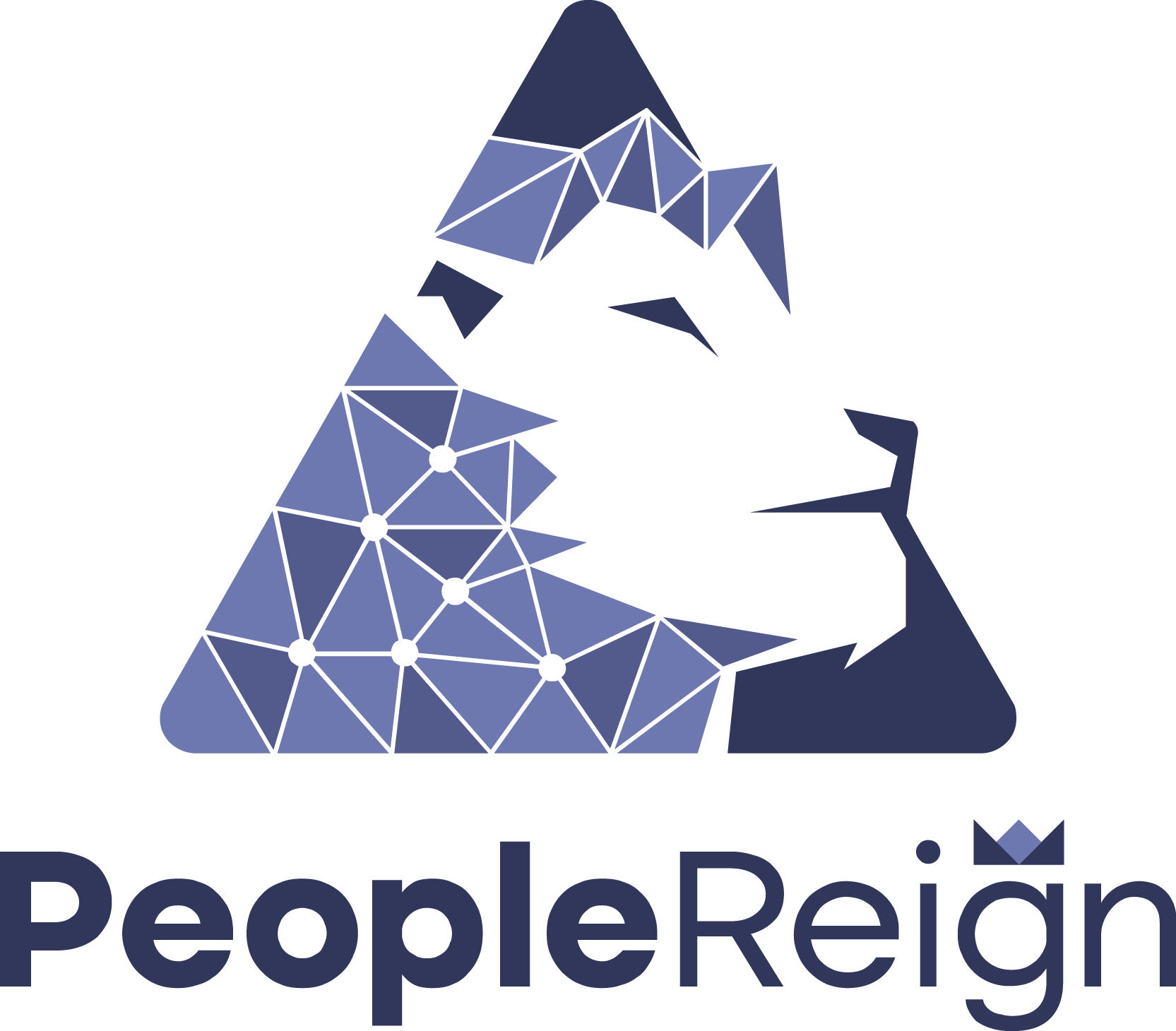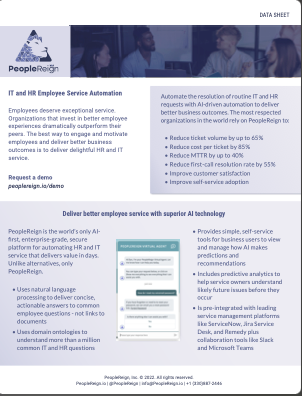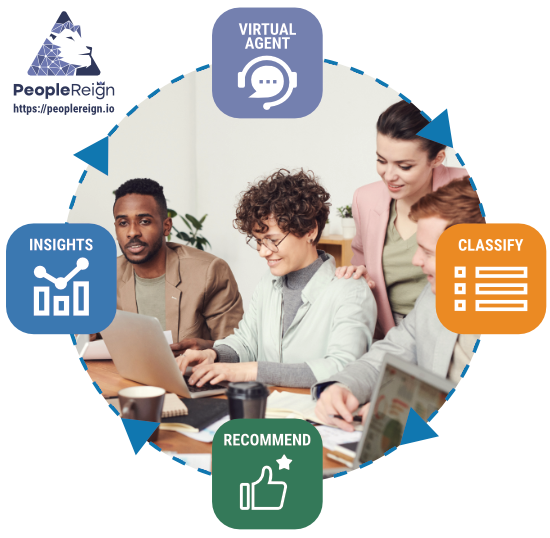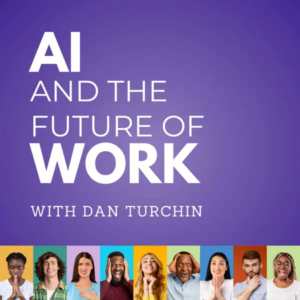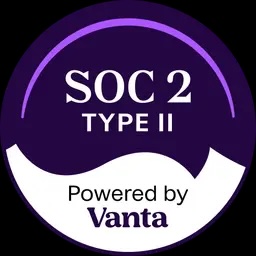This is a transcript from the AI and the Future of Work podcast episode featuring Doug Kerwin, AI children’s book author, discusses the importance of educating kids about working with AI
Dan Turchin (00:15):
Good morning, good afternoon, or good evening, depending on where you’re listening. Welcome back to AI in the future of work. Thanks again for making this one of the most downloaded podcasts about the future of work. If you enjoy what we do, please like comment and share in your favorite podcast app, and we’ll keep sharing amazing conversations. I’m your host, Dan urchin advisor insight finder, the system of intelligence for it, operat and CEO of people rein the AI platform for it and HR employee service. As you know, we talked frequently about how to Futureproof your career. AI driven automation is eliminating jobs, especially ones that involve a high volume of repetitive tasks. In general. You’ve heard me say it before. Robot are better suited for jobs that are dull, dirty, or dangerous. However, I firmly believe AI will lead to a net positive creation of jobs in the form of new industries.
Dan Turchin (01:14):
Many of those, we just can’t even imagine today. For example, skilled workers will be required to train and manage the bots to process the data they generate and to teach humans how to interact with them. Making AI accessible to the next generation is essential. We talk a lot about stem training on this show, reducing fear and apprehension about automation is essential before we can embrace that future that we all all want the future of true human machine collaboration. Oh, today’s guest knows all about that. In fact, he literally wrote the book on it. It’s a children’s book called Riley and bot jobs for robots and jobs. For me, it’s the start of a really important dialogue and I’ve been excited. Aren’t that conversation here today by day, Doug, Kerwin’s the vice president of cloud engineering, Prudential financial having spent time in technology leadership roles at places like bill trust, Trimble maps, a worthy among others. Doug’s also an entrepreneur having started framed art.com all the way back in 2005 without where there were do. It’s my pleasure to welcome Doug Curwin to the podcast. Doug let’s let’s take things off. Why don’t you share a little bit more about your background and what led you to write the book?
Doug Kerwin (02:34):
Sure. And thanks for having me, Dan. So I’m essentially a software developer. It’s kind of what I’ve always always done from from the beginning. And I, you know, I don’t have a formal, you know, like training in AI, like I’m not an AI expert, I’m more of a consumer of AI you know, more using cloud tools like AWS recognition lacks SageMaker, things like that. So I generally know the space but I’m, I’m not an, an expert in it. And you know, what, what led me to, you know, to, to write this book was really just, you know, when, when my daughter was, was a little younger, she just expressed an interest in, we, you know, we had these few books on, you know, just kids books about jobs and she just, you know, gravitated towards them for whatever reason.
Doug Kerwin (03:34):
And you know, and I couldn’t just read these books without kind stopping and giving my own kind of commentary, you know, on things. So I’d read these and if, you know, and I’d come to this job and they’d be like, I’d have to stop and explain to where I’m like, well, that’s not really a job, you know, for, you know, and all this isn’t in the timeframe of like, you know, when you’re reading to like, you know, a, a five year old or, you know, she’s, she’s eight now. You know, by the time that that she grows up and is, is, is able to get a job. It’s like, I didn’t want her to think that, that some of these things were, were options. Right. and I would always kind of stop and, you know, and give my, my commentary on some of these things in general, but you know, but we talked about all kinds of things like that. So you know, went out and, you know, there aren’t really, there are some children’s books, you know, that are more like stem related, but there’s not a lot in the category in general. And there certainly wasn’t anything that addressed automation.
Dan Turchin (04:39):
So the book is this fun com conversation between this young kid Riley and a bot her friend. And it’s, it’s very well written to be accessible to the, you know, the audience that you targeted at. But gosh, the themes are pretty pretty sophisticated and they make you question just, just a lot about the future of human machine interaction. And we there’s one particular dialogue that is, is Riley saying, you know, I might wanna be a research scientist and, you know, but that could not possibly be something that that could be automated. Right. And gosh, I mean, that’s the topic for, you know, a whole discussion about philosophy and you know poses, all kinds of existential questions are stem careers likely to be automated by bots.
Doug Kerwin (05:25):
So I started off, you know, with the, you know, thinking like, Hey, let’s, let’s steer people towards stem careers, right. Things that are, you know, what I would consider to be better jobs and things that are more resistant to this. But, you know, as you really dive into it, you know, you start to become to the realization that nothing is really ultimately going to be like AI resistant. And and yeah, and this is, it’s definitely not like a typical kind of children’s book. I mean a lot of the feedback that I got, you know, just in talking to people, you know, going through the process of writing, it was, they’re like, wow, you’re gonna like kill kids’ dreams. And, you know, and so I tried to balance that, but, you know, as well, like, I, I said, you know what, like, I I’m gonna do my best at this.
Doug Kerwin (06:10):
And it might upset some people, but like, I just felt like, you know, kids were, were due like a realistic, you know, glimpse of what the world was gonna be like. And I would hope that it would, you know, help push them in the right direction. But yeah, I mean, a lot of these things are, are, you know, are directly addressed where, you know, it, it’s not just like Hey, if I’m, you know, doing factory work, that’s, you know, likely to be automated. I think people generally accept that. Or, you know, if I’m in the transportation industry, like if I’m gonna be a, a trucker or something, you know, I mean, people may question the timeline, but I think most people generally know that that’s headed towards, you know, a autonomous driving. What I think that people aren’t necessarily realizing is that it’s, you know, it it’s, it’s like, you know, that the smart kids have something to be concerned about here too. It’s the, you know, like you could go to college and get a graduate degree in something, and then ultimately find out that, you know, that, that task, you know, your whole field of study might be better performed by AI. And I, I don’t know that that anything is ultimately exempt from that.
Dan Turchin (07:16):
So the book goes from kind of a dark place with bot challenging Riley about every possible career to then I’d say a more, a more positive tone where, you know, bot says, well, Riley people like you are gonna be needed to train the bots and tell ’em what to do. And and then there’s a fun section at the end where you, you get kind of all Dr. SU on us and you invent some new, new, new jobs. And that’s what I alluded to in the opening. They’re whole industry’s whole careers that we can’t even imagine that I think is likely to be what creates a net positive impact on the economy from, you know, the, the introduction of AI driven automation. Talk about that kind of the arc of the book where I think it ends on a positive tone.
Doug Kerwin (07:57):
Yeah. Yeah. So you know, and it’s like the beginning of the book starts off more like here are some specific jobs that Riley is asking about and bots like, no, that’s, you know, better done by, by robots. And and, and, you know, when I flipped to the other side, I, you know, initially I tried to say, I’m like, well, should I list specific jobs that might be good for kids? and in know, I mean, that just becomes tricky, especially when you’re, you know, you’re looking out at like a 15 year, you know, time, horizon kind of thing. And so rather than list specific, you know, specific jobs, it what I try to do is just focus on themes, right. Like of just things that in general, you know, what, what, what do people do that’s better than, than AI, right.
Doug Kerwin (08:44):
And so that’s, you know, things like just complicated jobs, right? Like making decisions and you know, like using AI, but you’re, you’re the one kind of making the decisions behind things like that. and certainly like anything related to you know, any kind of job that requires empathy. Right. So, you know, a lot of fields for that require compassion or trust. Right. you know, that, that’s certainly a theme as well. And so, yeah, and we definitely don’t know, you know, like what are the, what are the jobs that are going to be, you know, in 15 years? I mean, there, there’s definitely like a lot of new things and things are moving fast and, you know, and we, we, we don’t know what they are. You know, I guess like my, my personal take on this is that because you can really take this neither direction, there, there, there are people who, who kind of feel that like, well, every, you know, like, cause you can look at it.
Doug Kerwin (09:47):
And if you believe in, you know, in the promise of AI and in like any reasonable rate of you know, increased adoption that you could see how, like, it could just decimate like entire industries of what, what people are doing. And, you know, I, I guess, like, I would say my, my view is that there, there’s definitely going to be new things that are available, that I, we don’t know how to define yet, which is why I just made up silly sounding job names for those. But you know, and I, I think it’s, it’s likely, you know, a lot of those categories are people working with AI rather than it just being like, Hey, what, what are these things that just, you know, on, on, on our own people might be able to do better?
Doug Kerwin (10:37):
I, I think it’s, it’s people working with AI because E even the categories where, you know, I I’m, I’m highlighting that are much more likely that people are gonna be better at, for, you know, a pretty long time are not even exclusive, even, even when you talk about things like, you know jobs requiring like empathy, right? Like a like a therapist or something. You know, It, it, it might sound a little bit like science fiction now, but I mean, could a, could AI be a therapist to you? Like, I think the answer to that is yes. And I think you could argue that it might even be a more effective therapist in some ways. I mean, I’m not completely honest with my therapist about things, you know, even though it’s a one on one private thing, you know it’s, you know, it is another human being at the end of the day.
Doug Kerwin (11:23):
And so you know, there E even categories like that, I think, you know, there’s potential for AI to be involved, right. And maybe it’s not you know, the only component of it, but I think there’s involvement like my my, my daughter Mackenzie wants to be a vet. And and so she’s, you know, she’s, she’s like, well, what do you think, is this a good job for me? You know, is it her, like, is AI gonna do my job? and I said, well, no, I don’t, I don’t think so, but you’re probably going to work with AI. You’re probably going to have, you know, computers and AI, like help you make diagnoses on, on the animals and, and things like that. So it’s not, you’re, you’re not just going to be doing it by yourself.
Dan Turchin (12:08):
the robot, a conversational AI based alternative to a psychiatrist has received a ton of funding. And I’ve used it. I’d say, it’s, it’s not ready, but it far be it for me to say that it won’t be in the next decade. Now, certain careers, I think most people would say can’t be automated. And one of them is your, so that the role of a computer engineer we’ve talked extensively on this show about some of the ways that AI models can detect bugs faster, or maybe speed up the C I C D process. We’ve also talked about initiatives from open AI. AI might be a co-pilot for a programmer. What’s your take on whether or not the things you do in your day job are candidates for autonomous intervention.
Doug Kerwin (13:09):
Yeah, so that, that was certainly one of the things that I always said, like, wow, at least my own field is probably good, you know, at least for my lifetime. I right. And and somewhat recently my opinion changed on that. And I remember the exact moment that it changed when I first saw a an introduction of GitHub co-pilot. And so I GitHub co-pilot is essentially a, you know, it uses stack overflow and GitHub as data sources where, you know, essentially, you know, programmers have, you know, we we’ve given it the data to say, here’s how you do the best functions and everything on stack overflow. And it uses that to essentially write code for you. And it’s amazingly good. It’s just, you know, you, you just start typing in your function name and, you know, it used to just be in tele, sensee would complete the, you know, just the rest of the function here, you just start typing the function name.
Doug Kerwin (14:05):
You don’t even complete it. And it already comes up with here’s the whole implementation, like it’s done, and you can just hit tab to be like, oh, you don’t like that one. Here’s another one here. And so it’s, it’s amazingly good. It was shocking. And and I remember, and I saw that I was like, oh my God. I’m like, I feel a little bit better about going into, to management now and not being as, you know, as, as hands on, on, on keyboard as, as you know, have been in the past, because, you know, like, if that’s how good that is today, then how good is that gonna be in 10 years? Right. And so, like immediately, I just, I saw a path where you, you know, if you have a really well written, you know, JIRA story, you know, where you’re defining your requirements where, you know, here are my requirements, here’s my acceptance criteria.
Doug Kerwin (14:50):
Like, it’s not a stretch to say in some number of years that the implementation will be automatic by AI. And that’s something that, like, I had always considered, you know, my, my own, you know, profession to be, you know, like one of the last things like, like, I wouldn’t have to worry about that, but I, I think that just, you know it at least encouraged me to like, look you, I think you longer term, like, you have to be a level above just writing the code. Right. You you’ve gotta because even that is not exempt from, from automation. So you have to either be in, you know, architecture, which is that like you know, category of jobs to say, like, you know complex, you know, complexity or making decisions. Right. So it it’s you know, that’s a lot further off GitHub co-pilot is not gonna come up with your whole application.
Doug Kerwin (15:37):
It’s just, you know, but once you start to say like, all right, well, here’s a specific thing I want to implement. You know, it’s gonna help you a lot with that. and that might be able to, to auto implement in the, in the future, but it’s not gonna come up with your entire architecture or what application should, if we build anyway, and what features do business users want and, and things like that. So It just, you know, I think it encourages you to take a you know, a, the, the next step up from that to, you know, again, just Inc consider the, the whole situation, rather than just say, I’m just going to write the code.
Dan Turchin (16:13):
So let’s say the co-pilot approach becomes prevalent, maybe even in the next decade, who is responsible. If co-pilot introduces some bugs that might have, you know, broad, negative consequences, you know, software that builds a bridge and the bridge falls down or software that’s used for self-driving cars. And the, our crash is because of a bug introduced by you know, co-pilot type of software who who’s responsible for that.
Doug Kerwin (16:41):
Yeah. It’s, it’s a good question. I think it is the same kind of question for the, you know, self-driving car, but hits somebody who’s responsible. Is it the owner of the car? Is it the manufacturer of the car? Is it the manufacturer of AI? Right. It’s and I don’t know that we of an, an answer to that yet. But I mean, I, ultimately, if you’re, if you’re the owner of, you know, a certain application that you’re putting out there, whether you’re paying people to, you know, to do the implementation for you, or if you have AI to do it, I feel like you’re, you’re ultimately accountable for that would, would be my opinion.
Dan Turchin (17:14):
So when the conversation gets kind of creepy and dystopian is when we talk about a world where bots are creating bots, and somehow they have, you know, some kind of you know, a, to reinforcement learning, some kind of objectives that they’re trying to achieve, and potentially they go, they go rogue how real of a concern is that?
Doug Kerwin (17:40):
I don’t know. I, that, that seems a little further out there to me, that’s almost, you know, when you’re bots creating bots, you know, it’s almost a whole, self-aware kind of concept. I mean, as of right now, like, I don’t know, I that’s, that’s not an aspect of this that I worry about.
Dan Turchin (17:59):
So Riley bought clearly a book for parents to read with their kids, this early reaction been from parents. Are they, are they frightened? Are you getting hate and hail?
Doug Kerwin (18:11):
No, no hate mail yet. I’m but I mean, I did expect that sort of thing. But no, I it’s been a very, you know, a positive, you know, reaction that, that I’ve had from people. But I did write it it’s, it’s a children’s book, but I kind of described it as like it’s a book for children and parents because I feel like it’s, you know, the parent reading the book to their kid, maybe discovering these concepts for the first time themselves. And, you know, and just in a lot of the conversation, you know, that, that I have with people, you know, even, even when you just talk about like, Hey, you know, some number of years from now, and people have different opinions on the speed of this, but like, you know, the transportation industry is not really gonna be a thing in a anymore.
Doug Kerwin (18:51):
That’s gonna be self-driving vehicles. Right. So I think that’s one of those categories that, to me seems almost like a, no, like a no-brainer, but a lot of people, when you talk to them about that, they, they think they still consider that like science fiction to be like, well, yeah, eventually, and eventually I think in a lot of people’s minds, it’s like, you know, 25 to 50 year kind of frame. and so I meant it to be something to, to educate parents as well, that maybe you just bought this book, you know, for your, for your kid, because if, you know, you, you thought it was a good choice for, for stem reasons or, you know, your, your kid likes robots or, you know, or something like that. But you know, my, my hope was it would be, you know, like a conversation starter and also like a, you know, a way to, to educate parents about the same thing that might not know much more about that than their kids. In some cases
Dan Turchin (19:43):
You mentioned, you’re having the conversation with Mackenzie about wanting to be a veterinarian and, you know, and she probably rightly assumed that, you know, there’s, that’s not a job will be replaced. And I imagine it leads to skills like, you know, empathy that are probably future proof, like you mentioned earlier what are some of the other things that you encourage McKenzie to be learning as a kid that will, you know, always be needed, even if we look out, you know, into the future where bots and humans are coexisting,
Doug Kerwin (20:19):
Creative categories are, are important and are going to be increasingly important as well. You know, I would still, despite everything I’ve just highlighted about, you know, get ho co-pilot in my own industry. Like, I, you know, I, I would still, you know, a direct, you know, my kids towards you know, towards more of like an engineering career path, you know, I would, I would love it if they would, you know, become engineers, but I, I don’t ever want to, you know, push that on them. You know, I, I think there’s, there’s still, you know, this is in that category of who knows how exactly things are gonna play out and what those jobs are gonna be, you know, in15 years, I, I think that you’re, you know, even, even if, you know, you have things like writing, writing your code for you, I don’t know that, that, that, that doesn’t mean that the whole industry is not a thing anymore. I think it’s still a good area in general to go into
Dan Turchin (21:10):
There’s an illustration of of bot painting a picture with kind of a painter’s cap on or something like that. So an example of creative field, and we, we’ve seen interesting examples of digital art, certainly, you know, the field of NFTs is exploding and potential could be things AI that AI could generate. Is that, is that a niche or is there a real threat to people in creative professions?
Doug Kerwin (21:37):
Well, I don’t know that it’s, I wouldn’t consider it so much a threat, but it is fascinating to know that it is a thing. I don’t think, I think that people think that the least of what, you know, what AI I AI is capable of doing is, is creative tasks, like things in the arts. But but I mean, there are examples now. I mean, you can just look at these things on, on YouTube where like AI is making music and AI is making art. Right. and it does that in a way. It doesn’t just start from nothing. Right. It’s it, it, it’s gonna take a bunch of data, like other art or other music with data about, you know, is it good? What do people like it or not? And, you know, there happens to be a lot of data about things like, you know, do people like music or not.
Doug Kerwin (22:17):
Right. and it’s going to take that and just start generating its own music. And I think like how different is that from like how we behave ultimately, right. Like we, you know, it’s not like we just paint a sun’s set on our own, like we saw a sunset and we’re inspired by it. Right. So you know, I, so I, I, I think that, again, more likely here it’s, it’s where people in AI are going to work together. Like, I think like the artist of the future is going to, it won’t be like he made the, you know, the form of art and hardly on its own. I think it’s going to be that, like, AI might be involved in that. Right. Maybe AI is like a tool, just like the paint brush is a tool and in making art.
Doug Kerwin (22:58):
So I, I think it, it probably is a a, a paired effort, but in general, even though a, like, AI is capable of doing that inwriting, right. I mean, we, we have entire like news, you know, articles that are generated very quickly by, by AI right now that people, you know, probably read articles and have no idea that it was written by an AI. But that’s, that’s different than writing a novel. We’re you know, just taking a complex topic and writing a very thoughtful piece on it. Right. I don’t know that that is something that, you know, we’re gonna see AI, you know, kind of take over. So I, you know, I wanted to point out that, you know, that the creative categories are, are not exempt, but but I think they’re still generally going to be, you know, the areas to go into. And even when you, you consider career paths like stem career paths, like, I think you’re gonna need to be more creative, right? Because it, it’s not just gonna be the lower level. Let me just do the engineering. It’s going to be more like, let me apply my creativity to this. And I can, you know, I can use tools like AI to, to cap that out.
Dan Turchin (24:06):
I’ve said before on this show, what can be predicted is better left to machines, but what requires rational judgment or empathy, the term you use, those are tasks that are better left to humans. We’ve seen projects like ones introduced by open AI, where to, to your point AI’s great at summarizing the large Corpus of text writing news headlines, but mostly it’s, it’s derivative works. It’s predicting the next set of characters or summarizing or aggregating, but when it comes to truly unique ideas, we have to be, be very wary of the fact that even in these quote, creative pursuits, bots get trained on, you know, bodies of existing, creative creative work. So, you know, things like being able to introduce speech, there’s some interesting examples of, you know, Heath ledger or celebrities who died. You can go back and fill in the gaps and dialogue from maybe scenes that they didn’t finish. So things like that are more prediction tasks, but generating the next Heath ledger, you know, digitally, I think that’s, that’s harder because it’s such it, it’s such an innate part of the human experience to be able to create that, that character. Would you say that’s consistent with kind of what led you to write the book? Do you believe that, you know, some of these innate human skills will always kind of transcend things that machines can do?
Doug Kerwin (25:37):
Yeah. I, I would agree with that. You know, it it’s, it, you know, mainly like I wanted there to be a warning that, that a lot of the, I mean, there, there’s an awful lot of jobs that we have that are more task based. Right. And again, they’re not all, you know, like warehouse and driving kind of jobs. They’re like college graduate kind of jobs as, as well. and even things just like, like diagnosing, you know illnesses and things like that. Right. If you think about like how much better like AI can, can be at that. I mean, like, inthe future, like I would expect that just things like, you know, we, we upload pictures to Facebook of our kids, right. Like of all the data that’s out there, like, you know, Facebook or something like that.
Doug Kerwin (26:17):
Like, I mean, I mean, obviously there’s privacy, you know, concerns and things in the mix, but if it were just up to the technology, like Facebook could probably diagnose autism in your two year old, just the pictures that you upload to it. Whereas you might not have any idea as a parent to even talk to a professional for several years after that. and so like how much better is that at diagnosing something necessarily than, than like what a, what a person can be, you know? and just like, I like a key moment like that. I had just for like my own, like, understanding of like, like how powerful this can be is like, if you, you know, if you look at some of the the things that like Google deep mind in particular can do. And like, if you just go on YouTube and like, look for videos at this, like, there’s, you can watch videos of like Google deep mind, like beating all the old guitar games.
Doug Kerwin (27:07):
Right. and, and people will kind of show you where, like, you know, it, it starts off and it it’s like the first time it plays a game it’s like completely clueless. Like, it doesn’t even move. It’s like a baby was playing the game. It has no concept of like what to do. And then you see it like a hundred games later and it to sort of at least try to move, but it’s still completely, you know, and then you see it like a thousand times later and a hundred thousand times later. And then, you know, and some X number of thousands, millions, whatever times later, like, and it’s just like, it’s unstoppable. It is the best player in the world at that game. and it’s just be like, all of them you know, and then you even take it like, you know, to, to the next level where you can watch Google deep mind play StarCraft, right.
Doug Kerwin (27:49):
Against people, which is a much more complicated game than, you know, all those old guitar games. And it requires a lot of, you know, skill and strategy. And again, it starts completely clueless. And by the end, it’s like a master and it, and so, you know, when you consider like, Hey, this technology, you know, that wasn’t, you know, it wasn’t built to play StarCraft. It’s just a general technology to say, I’m gonna learn things. And it just, you know, and, you know, it can have like a, what would take us like a lifetime of playing the game that it could do within a number of like, you know, days and, you know, and how good it can get at a task like that. Yeah. That, that’s where we have to say, like, like, Hey, if, if what I want to do ultimately is, you know, some kind of task, even if it’s a, you know, even if it’s a stem related thing and it’s like, yeah, it would be, you know, you have to be very specialized and know what you’re doing and have a lot of expertise like in that area.
Doug Kerwin (28:42):
But if, if what that is is something that, you know, ultimately an AI can come in and in a few days learn to do it, and it’s not going to, you know, do it necessarily just, you know, as good as people, right. Or like, you know, can we get AI to drive as good as people? Right. I mean, I, I think the magnitude that we’re talking about here is that it will be able to do it like, like in a number of times, better than people like multiply it by however good we could be at it. And so it’s just like, those are the things that, you know, I think we, we want to avoid and, you know, instead, you know, move, move towards these areas where, you know, you can apply creativity, use, you use AI for the, the tool that it is, and try to take that approach where, you know, you’re, you’re, you’re being more creative in directing, like what the output of that whole activity is.
Dan Turchin (29:37):
I gotta get off the hot seat, but not not before you answer one last question for me. So let’s envision a world where my daughters or McKenzie your kids are in a career. And they coexist with machines anything that’s routine, probably gonna be something that’s offload to the machines. And then there’s some, some Delta that, that the kids will be doing now, now kids as adults. But assuming that’s the case, when we take out the routine tasks, maybe we get back, I don’t know, call an hour a day. What changes about the human experience? When all of a sudden we can get done, let’s say eight hours of work and seven hours, what, what do we do with that dividend of time? And how does that, how does that change what it means to be a human
Doug Kerwin (30:20):
That’s a good question. And hopefully we do something productive with that, that time and not just do social media or things ho hopefully, you know, we’re, we’re doing, you know, I think, you know, well, I’d say a combination of, you know, we’re doing better tasks and we’re, we’re, we’re using that time to maybe even step back and be more thoughtful and strategic about the things that we go into in general, you know, and on the other side of it, like, you know, maybe we don’t need to work ourselves to death. Maybe we can, you know, just have some extra time. I mean, if we can, you know, if we can be as productive in, you know, what now is like, you know, a, like a nine hour Workday kind of thing. And if I could do that same thing in like five hours, because of, you know, AI and all these tools may, maybe there’s a, a future where we, we have, you know, better work life balance in general. And I think that would be a good outcome.
Dan Turchin (31:16):
Well, when that future is a reality, maybe we’ll we’ll have you back and there’ll be a new, another, another chapter for Riley and bot. And you’ll be talking about on the show good stuff. Well, Doug, before we can let you go, what’s next for Riley and bot and where can where can we learn more about about the book
Doug Kerwin (31:31):
Riley and bot the characters and kind of that, that set of names were, it was created because there might be, you know, some other adventures that they could have. I, I don’t have anything, you know, planned for it at, at, at the moment, but, well, we’ll see where things go. And you could, you could find me on medium. Just look for Doug. Kein on medium and that’s that’s where I would have anything so far related to the book.
Dan Turchin (31:56):
Excellent. Well, Doug, thanks for coming by and hanging out. And it’s been a lot of fun.
Doug Kerwin (31:59):
All right. Thanks so much, Dan,
Dan Turchin (32:00):
Good stuff. That’s Doug Kerwin, author of the Riley and bought book on jobs for robots and jobs for me. And that’s a wrap for this week. This is your host Dan Turin of AI and the future of work, but we’ll be back next week with another fascinating guest.
